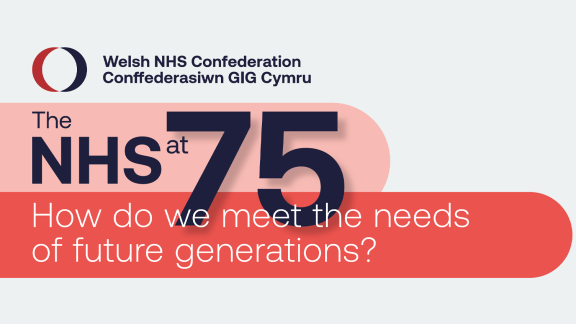Understanding public perceptions and attitudes to the NHS

Background
The NHS has been under serious pressure and ‘running hot’ for several years, having seen spending increase far below average between 2009 and 2019, which has contributed to staff vacancies, an ageing estate and record waiting lists for treatment: problems that have been exacerbated significantly by the COVID-19 pandemic.
Recovery efforts are ongoing and the NHS is considered to be one of the most productive and efficient healthcare systems in the world. In England, the elective care backlogs of two-year and 18-month waiters has been ‘virtually cleared’, the diagnostic waiting list is reducing, primary care teams continue to see very high volumes of patients and GP referral times are shortening.
However, the level and complexity of demand is failing to keep up with the resource allocated. In particular, the NHS is constrained by having over 112,000 vacancies in England and a maintenance backlog for capital investment that now exceeds £10 billion. Also, the social care sector is going through its own crisis following its neglect by successive governments and public health funding has been cut year on year, which collectively contribute to greater illness in the community, higher bed occupancy in hospitals and this further inhibits performance.
The NHS is progressing an ambitious reform agenda as legislated in the Health and Social Care Act with the establishment of statutory integrated care systems in England, which are designed to better plan and join up services for the benefit of their local communities. However, these systems are only a year old and need more time and support to embed.
These challenges are having an impact on public satisfaction, with the latest British Social Attitudes Survey (BSA) showing that overall satisfaction fell to just one in three (29 per cent) - the lowest figure on record. However, the same survey found that support for the founding principles of the NHS remains strong, with 94 per cent believing the NHS should remain free of charge, 86 per cent saying it should be primarily funded through taxation and 83 per cent agreeing the service should be available to everyone.
On the year of the NHS’s 75th anniversary, the NHS Confederation has partnered with Ipsos to better understand current perceptions, experiences and priorities in relation to the NHS.
Methodology
The NHS Confederation-commissioned survey, undertaken by Ipsos, was conducted between 30 March and 5 April 2023.
Using the Ipsos UK Knowledge Panel – a random probability online panel – a total of 2,695 people across England, Wales and Northern Ireland were selected and invited to take part in a survey on this topic, of which 1,555 participants aged 16+ responded (a 52 per cent response rate). The sample was stratified by nation and education.
A weighting spec was applied to the data in line with the target sample profile; this included one which corrected for unequal probabilities of selection of household members (to account for two members who may have been selected from one household), and weights for region, an interlocked variable of gender by age, education, ethnicity, index of multiple deprivation (quintiles), and number of adults in the household.
The results in this report cover the findings across England, Wales and Northern Ireland as a whole; however, breakdowns for the individual nations can be made available on a case-by-case basis, on request.
Key findings
- Despite the challenges faced by the service, there remains a high level of support for the founding principles of the NHS. A majority agree that the NHS should provide a comprehensive service available to all (87 per cent), remain free at the point of delivery (also 87 per cent) and be funded primarily via taxation (83 per cent).
- Ratings of how NHS staff are treated are low, with half (52 per cent) dissatisfied with how well staff are treated in the NHS. This reflects that a majority (81 per cent) say that there are too few frontline staff working in the health service at present.
- While people are supportive of the NHS model, more are dissatisfied than satisfied with how long they have to wait for certain key services. They highlight funding, low staffing and social care provision as key enablers to help the NHS improve.
- The majority do not think the NHS receives enough funding (69 per cent), though six in ten (61 per cent) think it needs to make big changes to the way it runs and provides services to improve, as well as more money.
- Reflecting the areas of most concern at present, the public want the NHS to prioritise increasing the number of staff working in the NHS (45 per cent) and improving staff wellbeing (30 per cent) in the near future, alongside reducing waiting times for core services (36 per cent want the NHS to prioritise reducing waiting times for A&E; 35 per cent improving waiting times for routine hospital treatment and care; and 32 per cent improving access to face-to-face GP appointments).
- When presented with potential actions the NHS could take to address the challenges it is facing, the actions the English public think will most help are increasing capacity in social care settings so that people can leave hospital sooner, developing a workforce plan for the number and types of staff the NHS will need to deliver services in the future, and introducing a seven-day work week for all parts of the NHS, meaning appointments are offered at a wider range of dates and times, including at the weekend.
- The English, Welsh and Northern Irish public attribute the elective care backlog to a mix of factors. Most typically believe it has resulted from a lack of staff (49 per cent) and space in social care settings (43 per cent), as well as the cancellation of routine treatment and care during the pandemic (42 per cent), and there not being enough funding for the NHS (40 per cent).
There is strong support for the founding principles of the NHS
A significant majority say that the NHS should still: be free at the point of delivery (87 per cent), provide a comprehensive service available to everyone (87 per cent) and be primary funded via taxation (83 per cent).
Around half believe the NHS is one of the best in the world
Around half (52 per cent) of the public agree that Britain’s National Health Service is one of the best in the world.
People feel the NHS does not have enough money
Around two-thirds of the public (69 per cent) think the NHS does not receive enough funding at the moment.
People tend to be more dissatisfied than satisfied with access and waiting times
More people are dissatisfied than not with how long they have to wait for key NHS services, despite the huge volumes of activity delivered. Further slides explore the public’s perceptions of the key reasons behind this and what support is needed.
The elective care backlog is primarily attributed to a lack of resource and capacity in the NHS and social care, as well as the pandemic
The public attribute the elective care backlog to there not being enough staff working in the NHS (49 per cent), a lack of space in social care settings (43 per cent) and there not being enough funding for the NHS (40 per cent). The cancellation of routine treatment and care during the pandemic is also seen as a key factor (42 per cent).
People are dissatisfied with how NHS staff are treated and how joined up the NHS is
People are more dissatisfied than satisfied with how well staff are treated in the NHS (52 per cent dissatisfied, 21 per cent satisfied) and how joined up services are (40 per cent dissatisfied, 26 per cent satisfied). A majority are satisfied with the cleanliness of NHS facilities (69 per cent), while 49 per cent are satisfied with the general condition of NHS buildings.
Public recommendations for solutions
The public think the NHS needs a combination of more funding and big changes to the way it runs and provides services in order to improve
Three in five of the public (61 per cent) think the NHS needs both more money and to make big changes to the way in which it runs and provides services in order to improve, although 19 per cent think it just needs more money, and 16 per cent that it just needs big changes.
The public prioritise increasing staff numbers over other actions the NHS might take to improve
Nearly half of participants (45 per cent) think that increasing the number of staff in the NHS should be prioritised, followed by around a third that want to prioritise improving waiting times for A&E (36 per cent) or routine services (35 per cent), making it easier to get face-to-face GP appointments (32 per cent), and improving the wellbeing of NHS staff (30 per cent).
Priority actions to help the NHS
The public are most likely to say that increasing capacity in social care settings would most help the NHS address the challenges it faces, followed by developing a plan for the number and types of staff needed for the NHS to deliver services in the future, and introducing a seven-day work week for all parts of the NHS, meaning appointments are offered at a wider range of dates and times, including at weekends.
These findings are based on a “MaxDiff” prioritization exercise, which sorts through a wide number of options to establish what people see as most/least important. Respondents were shown four considerations on their screen and asked to rate which would most help and least help the NHS. The task was repeated between six and seven times with different combinations, and the results were then combined with each of the eleven considerations then scored on a scale on 0 to 100.
Further information
For further information about the survey findings, please contact: externalaffairs@nhsconfed.org
For further information about the survey methodology, please contact: kate.duxbury@ipsos.com



